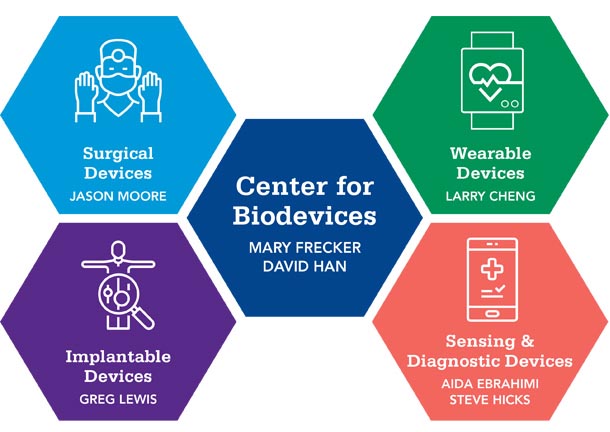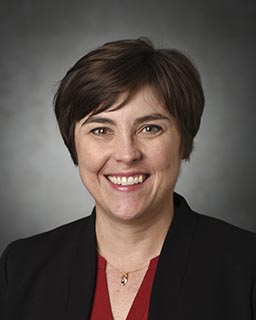Letter from the Director
November 2020
Welcome to the first Center for Biodevices newsletter! In this issue, you will find highlights of the center’s activities, as well as spotlights on the students, faculty, and industry partners who contribute to our success.
The Center for Biodevices was approved as a new research center by the Office of the Senior Vice President for Research in February 2020. We held the first FacultyXchange event on Feb. 25, 2020, which brought together researchers and clinicians from across the University through Pecha Kucha presentations, networking, and breakout discussions at the Juniata Valley Winery. The event was a great success, and we were poised to seriously ramp up the center’s activity. Two weeks later, everything shut down. Launching a new research center amid a global pandemic was not what I had planned, but like everyone else this year, I learned to be flexible and make the best of things.
Despite the challenges posed by the pandemic, the Center for Biodevices is off to a great start. A fantastic leadership team is on board to coordinate four research thrusts, as pictured below. Together, we have developed the center’s mission statement: The Center for Biodevices aims to bridge foundational science and clinical applications of biodevices, while enabling success of faculty, clinicians, and students across multiple disciplines. The center’s activities are focused on fostering collaborations and community around biodevice research. Together with the College of Medicine and the Center for Medical Innovation, we held a highly successful virtual Center for Biodevices Outcomes Day in September 2020 and are planning the second annual FacultyXchange event on Feb. 10, 2021. We have awarded the first round of the Penn State Biodevices Seed Grants , the Grace Woodward Research in Engineering and Medicine Grants , and the Leighton Riess Graduate Fellowships , all of which are featured in this newsletter. Additionally, the center’s Industry Advisory Board is in place and is tasked with providing industry perspective to help guide center activities. Our website is live and features up-to-date information on the center’s programs and activities.
Research thrusts:

The Center for Biodevices is a key partner in the University-wide Manufacturing and Sterilization for COVID-19 (MASC) effort, which started in March 2020 in response to PPE shortages at the Penn State Health System. Through projects ranging from mask testing to novel solutions to protect clinicians, the Center for Biodevices continues to support the MASC team. I have been serving as MASC co-director, along with Erika Swift and Michael Hickner, since summer 2020.
In closing, there are many people and units who deserve recognition for helping to establish the Center for Biodevices, organize events, and communicate our activities. I would like to thank the College of Engineering (Justin Schwartz, Chris Rahn, George Lesieutre, Debbie Mottin, Lori Long, Jane Harris, Ashley WennersHerron, and Susie Sherlock), the College of Medicine (Leslie Parent, Sarah Bronson, Erika Swift, and Brad Winters), the Materials Research Institute (Clive Randall), and the Huck Institutes for the Life Sciences (Andrew Read) for their support of the center. Further, I would like to thank the Center for Biodevices executive team (David Han, Aida Ebrahimi, Steve Hicks, Larry Cheng, Greg Lewis, and Jason Moore) for their leadership of the research thrust areas, willingness to participate in several half-day strategic planning sessions over Zoom, and facilitation of breakout groups. I am looking forward to continuing to advance the center’s mission, particularly when we can again meet in person at the winery!

- Director of the Center for Biodevices: Mary Frecker, Ph.D.
Professor of Mechanical Engineering and Biomedical Engineering
Riess Chair in Engineering
mxf36@psu.edu


